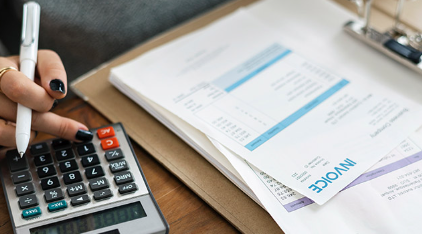What is the difference between exempt and zero-rated VAT in UAE?

Ever since the implementation of Value Added Tax in the UAE, businesses have been trying to deal with its rules and regulations. However, the most confusing part is understanding the difference between zero rated VAT and exempt VAT UAE. Although both the terms sound the same, they are different. In this comprehensive guide, we will help you to understand VAT, its implications, and the key difference between zero rated VAT and exempt VAT in the UAE.
What is Value Added Tax?
Introduced in January 2018 in the UAE, Value Added Tax or VAT is an indirect tax levied on the consumption of goods and services at each stage of the supply chain. It was established at a standard rate of 5% to support the UAE government in reducing its dependency on oil and other hydrocarbons as a source of revenue. VAT is ultimately borne by the customers, who are the end users of the supply chain. That is why it is also called consumption tax.
The Federal Tax Authority (FTA) is responsible for handling and collecting federal taxes and related fines and enforcing tax laws across the UAE. It collaborates with the Ministry of Finance, His Highness Sheikh Maktoum bin Mohammed bin Rashid Al Maktoum, to attain economic diversification in the country by emphasizing more on non-oil earnings. It also ensures that businesses and consumers fulfill their obligations and fully comprehend the country’s tax system, thus contributing to improving the financial stability of the UAE.
Under the Federal Decree-Law No. (8) of 2017 on Value Added Tax, the Federal Tax Authority (FTA) has divided VAT into three categories:
Standard rated – The goods and services that are taxable at a flat rate of 5% VAT are itemized in this category. The VAT consultants of Shuraa can provide you with a list of taxable goods and services in the UAE.
Zero-rated – Those goods and services that are taxed but at a rate of 0% are categorized under zero-rated supplies. For instance, if certain goods are exported to any Gulf Cooperation Council (GCC) country that has not implemented VAT, they would be subject to 0% VAT. It could be goods, passengers being transported internationally, or any other kind of transfer crossing cross UAE or part of it.
Exempt – Certain goods and services are neither charged any VAT nor incur any input charge or output charge, they are classified as exempt supplies. In simple terms, no VAT would be applied to these goods and services.
Difference between zero rated VAT and exempt VAT
Often, business owners are confused by the terms zero rated and exempt VAT UAE. Both have different implications and results. Here we have described some key differences between zero rated and exempt VAT UAE –
- In Zero rated, goods and services are subject to a 0% VAT rate, while no VAT is charged on exempt products and services.
- Zero-rated supplies are counted as taxable income, whereas exempt supplies are not included in the taxable revenue.
- Vendors can claim input tax on zero-rated supplies, which is not possible for exempted VAT items.
- Zero-rated supplies are included as part of the taxable turnover, whereas exempt goods are excluded.
- If the vendor makes zero-rated supplies and the value of the taxable goods exceeds the specified threshold, then they have to register for VAT. However, if the vendor only makes the exempt supplies, they won’t be qualified for VAT registration in UAE.
- Since vendors can claim input tax on Zero-rated supplies, they are required to document all their transactions for proof. For exempt supplies, it is not necessary as they cannot make any claims for tax.
Zero-rated supplies under VAT in the UAE
In Article 45 of the Decree Law, the below goods and services are counted as zero-rated –
- Educational services – These services will be classified as zero-rated if the curriculum is accredited by the Ministry of Education or another competent body, the institution is owned by the federal or local government or is majorly funded by the government. These institutions are also entitled to receive free printed and digital reading materials.
- Healthcare services – Services like therapeutic services and preventative therapies, shall be provided at no cost. Moreover, the healthcare body or institution, doctor, nurse, or technician such as a radiologist, dentist, or pharmacist who provides these services must be licensed by the Ministry of Health. However, certain services such as holiday accommodations and discretionary cosmetic treatment unprescribed by a doctor will not be included in this category.
- Residential building – Buildings that are designed to be occupied for human habitation or residential purposes will be counted as zero-rated supply. This includes orphanages, nursing homes, restrooms, and accommodation for the military forces. Hotels, motels, BNBs, or hospitals are excluded from this category. However, if a building is used as an office by its residents, then it would be considered a residential structure for tax purposes.
- Buildings used for charity – Buildings or structures that are designed specifically for charitable purposes are also included in this category.
- Direct export – Exports that are made directly to a location outside the implementing state would be zero-rated. If the recipient of the services does not live in the implementing state and does not receive services directly related to the property located in the state would be charged at zero percent.
- Export of telecommunication services – If the telecommunication services are provided by the implementing state to a supplier who lives outside the implementing state, such exports would be counted as zero-rated.
- International transportation services – International Transportation Services for both goods and passengers that are provided from one part of the state to another would be considered zero-rated supplies. It includes supplies delivered by an airplane or ship for consumption or sale, services provided during the conveyance of services, and postal stamps produced by the Emirates Post Group to transport products outside the country.
- Specific modes of transportation – Certain other means of transportation, such as commercial airplanes, ships, buses, and trains, that are used for the movement of products and services will be free of charge. However, it must be ensured that these transportation services are not used for enjoyment, pleasure, or sports.
- Supply of precious metals – The supply or import of precious metals done for investment purposes will be categorized under zero-rated.
Exempt supplies under VAT in the UAE
According to Article 46 of Federal Decree-Law Number 7 of 2017, only these things are free from VAT in the UAE:
- Financial services
- Residential buildings
- Undeveloped Land
- Local Passenger Transportation Services
When a product or service is VAT-free, it means:
- No VAT would be charged on the prices of exempted products.
- Businesses do not need to maintain sales records for VAT-free items.
- VAT incurred on purchases for exempted products cannot be claimed.
- The taxable turnover of the business will not include the sale of VAT-exempt items.
Conclusion
When it comes to managing VAT and taxation in the UAE, it is always better to have all of the details straightened out so that you can easily comply with all the rules and regulations. Besides, if you want to classify your business as zero rated and exempt VAT UAE, you can consult an expert VAT advisor such as Shuraa Tax and Accounting Consultancy who can guarantee compliance with the FTA guidelines and keep your business safe from penalties and legal implications.
For any further queries, connect to www.shuraatax.com







